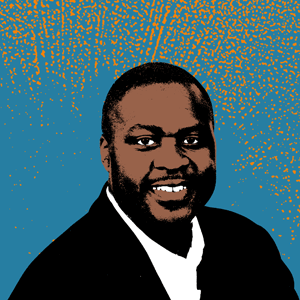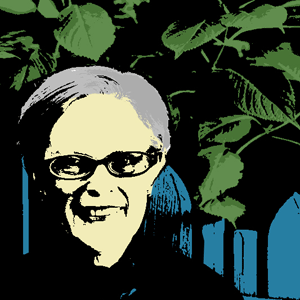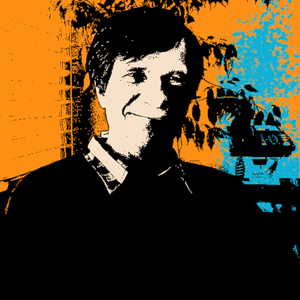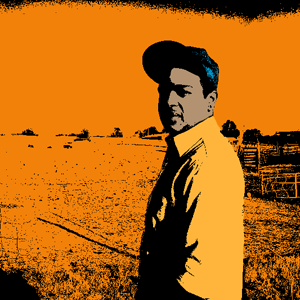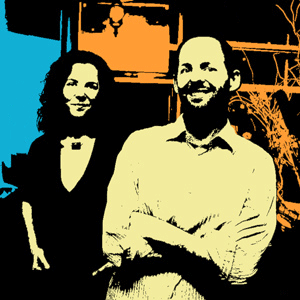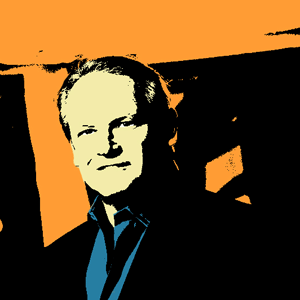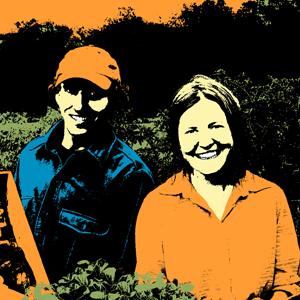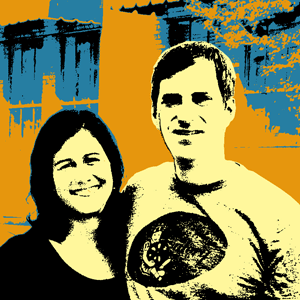Four decades after the first Earth Day, the circle of people working toward a cleaner, greener world has expanded way beyond treehugging hippies, red-paint-throwing protesters, posturing politicos, and card-carrying members of enviro groups. To mark this milestone, we’ve found 40 unexpected people who are altering the green landscape.
Erika Allen
Projects Manager, Growing Power
Chicago, Ill.
Erika Allen grew up on a farm in Rockville, Md., working in the fields with her father. “We didn’t have a TV and we relied on a wood stove, but we were known as the ‘food family’ because we had so much food. We could feed 30 people for supper,” she said recently. Today, her dad, Will Allen, is one of the world’s most famous farmers—the recipient of a MacArthur “genius” grant for his innovative work as an urban farmer/community organizer in Milwaukee, Wis. Erika is continuing the family mission as head of the Chicago operations of Growing Power, her dad’s nonprofit. Since launching the Chicago branch in 2002, she’s helped make one-time “food deserts” bloom, launching community gardens and bringing fresh food to economically devastated neighborhoods. Growing Power also employs inner-city teens to run a model veggie garden in Chicago’s lake-side Grant Park, where they harvest 50 varieties of heirloom vegetables, herbs, and edible flowers in the shadow of skyscrapers.
Ambessa Cantave
Educator, Alliance for Climate Education
Oakland, Calif.
Ambessa Cantave, 33, uses his skills as an entertainer and his green savvy to help young people throughout the Bay Area connect with the environmental movement. As an educator at the Alliance for Climate Education, he makes high-energy, inspiring presentations to high school kids about global warming (take notes, Al Gore). And as a cofounder and creative director at Grind for the Green, he uses hip-hop culture to help move at-risk youth toward good, green jobs. Cantave also spreads messages of eco-consciousness and self-awareness through the hip-hop group FIYAWATA. Read a Grist article about Cantave’s work at the Alliance.
Watch Cantave’s energizing Alliance for Climate Education presentation:
[vodpod id=Video.2225719&w=425&h=350&fv=%26rel%3D0%26border%3D0%26]
Ambrose Carroll
Pastor, Renewal Worship Center
Denver, Colo.
The Renewal Worship Center, founded in April 2009 by Rev. Ambrose Carroll, 40, is one of the first churches in the U.S. to have started up with an explicitly environmental emphasis; it also has a mission to reach out to all different kinds of people, including struggling African Americans in the inner city. Its nonprofit arm, RENEWAL, focuses on green-job training and placement in the northeastern Denver area. Carroll is also coordinator of Denver’s Green Jobs Interfaith Coalition and has collaborated with other Denver clergy to call for strong clean-energy and climate legislation.
 Nat Damm. original photo by Brian Smale
Nat Damm. original photo by Brian Smale
Valerie Casey
Founder, Designers Accord
Oakland, Calif.
Designer Valerie Casey, 37, wants to green not just her own projects but her entire industry. She started the Designers Accord—aka the “Kyoto Treaty of Design”—in 2007 to encourage the creative community to integrate the principles of sustainability into all design practice and to share knowledge with each other. So far, she estimates, more than 600 design firms, 30 corporations, and dozens of colleges and universities from more than 100 countries have ratified the accord. It all started in 2007 with a manifesto Casey wrote calling on the design community to “stimulate mass change” and “create a network in which every client is compelled to engage in a discussion of sustainability.” She now runs her own consultancy in San Francisco. Read about a talk Casey gave at South by Southwest.
Leslie Christian
Founder, Upstream 21 and Portfolio 21
Seattle, Wash.
“Small companies are critical to the future of our communities,” says Leslie Christian, 62—so she helped concoct an innovative way to support them. Upstream 21, whose board she chairs, is a Portland, Ore.-based regional holding company that acquires and supports small, locally focused, privately held companies in the Pacific Northwest—currently, three forest products companies that are embracing sustainable practices. Right from the drafting of its foundational document, Upstream 21 aimed to break away from business as usual: “Our corporate charter specifically states that the best interests of employees, customers, suppliers, the community, and the environment must be balanced with those of the shareholders over both the short and long term,” Christian explains. She is also president and CEO of Portfolio 21 Investments, which specializes in environmentally and socially responsible investing.
Watch Christian explain the Upstream 21 vision:
Robert Cialdini
Psychologist
Tempe, Ariz.
Robert Cialdini, 64, until recently a psychology and marketing professor at Arizona State University, wrote Influence, the classic book on persuasion. Lately he’s been researching the best ways to persuade people to save energy. In 2007, he coauthored a study [PDF] that found that giving people info about neighborhood energy-use norms (combined with smiley faces) led to large home energy savings. His research inspired the creation of the company Opower, which sells software that utilities can use to make smarter bills and inspire energy efficiency. Cialdini now serves as chief scientist for Opower and is president of the Influence at Work consulting firm. Read a Grist interview with Cialdini and Grist article about Cialdini’s work and Opower.
Jim Cochran
Farmer, Swanton Berry Farm
Davenport, Calif.
Despite what many consumers may think, organic rules don’t ensure fair treatment of workers—and tight profit margins mean that working conditions and pay on organic farms are too often no different from those in conventional operations. But Jim Cochran, 62, who launched California’s first organic strawberry farm in 1987, refused to accept the established norms. In 1998, he became the first organic grower to sign a contract with the United Farm Workers union—and he approached them. Then, in 2005, Cochran rolled out what might be the nation’s first stock-ownership plan for farm employees; workers begin earning stock in the operation after putting in 500 hours. “The dignity of farm labor is a founding principle of Swanton Berry Farm,” Cochran says. If the farm’s crowded stands at Bay Area farmers markets are any indication, it is possible to protect the earth, treat workers well, and make a profit at the same time.
Cisco DeVries
President, Renewable Funding
Oakland, Calif.
Sure, you’d love to have solar panels on your roof, but where would you get tens of thousands of dollars to install them? Cisco Devries, 36, has come up with an innovative answer: Property Assessed Clean Energy (PACE) is a new type of financing program that lets private property owners pay for energy-efficiency and renewable-energy projects over 10 to 20 years via an addition to their property tax bill, instead of coming up with the cash up front; the financing comes via municipal bonds, and if an owner sells the property, the tax surcharge transfers to the new owner. The concept was first introduced in (where else?) Berkeley, Calif., in 2007; since then, 17 states have cleared the way for municipalities to use property taxes in this way, and more than 200 U.S. cities and counties are working to launch programs. DeVries’ company, Renewable Funding, helps communities set up and run PACE programs. Read a Grist post by DeVries.
Matt Golden
President, Founder, and Chief Building Scientist, Recurve
Sausalito, Calif.
Matt Golden, 35, has become a golden boy of the nascent energy-efficiency industry. He started Recurve—formerly called Sustainable Spaces—back in 2004 before retrofit was hip. While Recurve works on a software-driven solution to scale up the energy-efficiency business from mom-and-pop shops to a sustainable industry, Golden spends much of his time in Washington lobbying for Home Star and other legislation to fund energy-efficiency work and create thousands of jobs. Read more about Golden in a Grist article on Home Star and a Grist article on Sustainable Spaces.
Zakiya Harris
Founder and Executive Director, Grind for the Green
Berkeley, Calif.
Zakiya Harris, 32, founded Grind for the Green in 2007 to use hip-hop to move youth of color from the margins to the epicenter of the green movement, helping steer them toward educational opportunities and green careers. The group puts on the solar-powered G4G Eco-Music Festival in San Francisco, and this Earth Day it’s rolling out a Get Fresh campaign that aims to get young people educated about and active in environmental issues. Harris also makes her own music as one half of the eco-conscious hip-hop duo FIYAWATA and works as an eco-marketing consultant.
Leanne Mai-ly Hilgart
Founder, Vaute Couture
Chicago, Ill.
Leanne Mai-ly Hilgart, 27, launched Vaute Couture last year with a line of chic, eco-friendly, cruelty-free, ethically and locally produced coats that are warm enough for Chicago winters. As a vegan, model, and MBA, she brings a unique perspective to her work—and strong values too; all profits from one of her styles are donated to Farm Sanctuary, a haven for rescued farm animals. Vaute Couture also sells vegan-themed T-shirts and jewelry. Hilgart tells you about it all on her blog.
Watch Hilgart talk about her business:
Rob Jones
Cofounder, Crop Mob
Carrboro, N.C.
Like a growing number of young folks across the country, Rob Jones, 27, likes to get his hands in the dirt, making his foodshed and community more robust and vibrant. Once each month, Jones and a band of young agrarians alight upon an area farm. Calling themselves the Crop Mob, they do a big project together—say, break new ground for raised beds or harvest a labor-intensive crop like sweet potatoes. The host farmers make a big meal, and everyone eats together. Sustainable agriculture is “way, way, way more labor-intensive than industrial agriculture,” Jones told The New York Times Magazine, and the long hours can hamper one’s social life. Crop Mobs help by creating a “sense of community that people are looking for”—and “you get a lot of work done.” Since the Times article came out, the idea has gone viral. Crop Mobs have broken out all over the country. Read a Grist article about Crop Mobs.
Dorothy Le
Planning and Policy Director, Los Angeles County Bicycle Coalition
Los Angeles, Calif.
Dorothy Le wants to get you out and about on two wheels. Not sure where to start? Watch her series of videos on how to find the bike that’s right for you. At the Los Angeles County Bicycle Coalition, she works to make the archetypal car-obsessed city more welcoming to cyclists and to make the cycling community more welcoming to women and people of color. Le has organized community bike tours, women’s bicycle rides, safety workshops, a bicycle count. While a student at UCLA, she led E3: Ecology, Economy, Equity, an environmental and social-justice organization, and helped launch the Green Initiative Fund, a grant-making fund for sustainability projects on the UCLA campus.
Watch a video about Le’s bike activism:
Anita Maltbia
Director, Green Impact Zone
Kansas City, Mo.
Anita Maltbia is spearheading the transformation of 150 square blocks of Kansas City, Mo., from blight to bright. The Green Impact Zone project, which she directs, is resuscitating this economically depressed African-American neighborhood by putting local residents to work weatherizing the zone’s 2,500 homes and by developing a bus rapid-transit system that will connect the zone to other parts of the region. With $50 million in funding from the federal economic-stimulus package, the initiative will also offer community policing, job training, and health and wellness programs. Maltbia, who has 30 years of experience in city government and community activism, earned a coveted spot in the First Lady’s box at this year’s State of the Union address.
Valerie Martinez
Executive Director, Indigenous People’s Green Jobs Coalition
Minneapolis, Minn.
Valerie Martinez, a 31-year-old Mexican/Cree/Apache/Ojibwe woman, spreads the benefits of the green economy to American-Indian communities in Minnesota through the Indigenous People’s Green Jobs Coalition. She’s also working with urban-ag pioneer Will Allen to bring small-scale sustainable food production to Little Earth of United Tribes, an affordable-housing community for Native Americans in south Minneapolis.
Mike Mathieu
Founder, Front Seat
Seattle, Wash.
After working at Microsoft and founding an internet publishing firm, Mike Mathieu, 41, decided to put his software smarts to work for the greater social good. Seattle-based Front Seat, which he founded and chairs, has launched “civic software” projects like Walk Score, which shows you how walkable any given U.S. address is (Grist HQ scores a whopping 98 out of 100—a “Walkers’ Paradise”), and City-Go-Round, which spotlights innovative public transit apps, like Exit Strategy NYC, an app that shows you exactly where you should stand on the subway platform to arrive directly in front of the exit at your destination (brilliant). Walk Score has already started to change the way the real estate industry thinks about walkability; its scores have been incorporated into real-estate sites like Zillow.com as well as many agents’ individual listings, giving prospective homebuyers more info about the kinds of neighborhoods and lifestyles they might be buying into.
Patti Moreno
Founder, Garden Girl TV and Urban Sustainable Living
Roxbury, Mass.
Patti Moreno, 38, aka “The Garden Girl,” wants to sow the seeds of inspiration and get everyone growing organic veggies and living a more self-sustaining life. In her how-to videos and on her websites, Garden Girl TV and Urban Sustainable Living, she demystifies gardening (indoor and out), raising chickens, shearing rabbits, spinning wool, cooking, and even aquaculture. Before you know it, her infectious enthusiasm could have you not just building raised garden beds but considering goat adoption. Watch Garden Girl videos on Grist.
Watch Garden Girl explain how to start a vegetable garden:
Irma Muñoz
Founder, Mujeres de la Tierra
Baldwin Vista, Calif.
Los Angeles native Irma Muñoz, 57, founded Mujeres de la Tierra (Women of the Earth) in 2004, after two neighbors died of cancers that they suspected had been caused by nearby oil wells. Her group organizes women in Southern California to fight for cleaner, healthier neighborhoods for their families. Muñoz also serves as an environmental affairs commissioner for Los Angeles. “I think when you talk about the environment, most people are talking about the natural elements: air, water, the earth. But for me, and for many in my community, the environment starts with the family,” she says.
Chandrasekhar “Spike” Narayan
Leader of Science and Technology Organization, IBM’s Almaden Research Center
Silicon Valley, Calif.
Spike Narayan and his team at IBM’s Almaden Research Center work on bleeding-edge technologies that are at the nexus of efforts to create a sustainable world—endlessly recyclable plastics, lithium-air batteries that could dramatically extend the range of electric cars, and infrastructure for smart cities. Given Narayan and the Almaden Research Center’s proximity to Silicon Valley venture capitalists and entrepreneurs, expect to see some of these technologies hit the market in the coming years.
Jack Newman
Cofounder and Senior Vice President of Research, Amyris
Berkeley, Calif.
He may look like an amiable Deadhead, but Jack Newman, 44—that would be Dr. Newman to you—is a Berkeley microbiologist who cofounded Amyris, a start-up that went from bioengineering a microbe to produce an anti-malarial drug to genetically tweaking a bug to excrete biodiesel (crazy, right?). Amyris, which has a pilot project under way in Brazil, is backed by high-profile Silicon Valley venture capitalists.
Brenda Palms-Barber
Chief Executive Director, North Lawndale Employment Network
Chicago, Ill.
Brenda Palms-Barber never meant to start a green project. She just wanted to create jobs for the residents of Chicago’s North Lawndale neighborhood, 57 percent of whom have been incarcerated or had some involvement with the criminal justice system. As chief executive director of the North Lawndale Employment Network, she hatched the idea for Sweet Beginnings, an urban honey farming business that trains and employs locals who would otherwise have a hard time finding a job. In addition to selling honey, Sweet Beginnings produces the beeline brand of all-natural personal-care products, which are now sold in Chicago Whole Foods stores, among other outlets. A sweet idea all around.
Steve Price
Digital Designer, Urban Advantage
El Cerrito, Calif.
Digital artist Steve Price, 59, wants to show you the future of green urbanism—literally show you. He creates photo simulations of what blighted urban landscapes would look like if they were transformed into healthier, safer, more sustainable places—and pretty sweet spots to live. Price’s Berkeley firm, Urban Advantage, builds “photo-realistic visualizations” for developers, design firms, and local governments that want to show how walkable urban development could revitalize an area. “Everybody kind of nods and agrees and knits their brows as they listen to statistics and information about economic development,” Price said of the public meetings he’s attended. “Then they see the pictures, and that’s when the smiles occur. And the ‘oohs’ and ‘ahs.'” Read a Grist profile of Price.
Ooh and ah over this animation of a street in Lancaster, Calif.:
LaDonna Redmond
President, Institute for Community Resource Development; Founder, Graffiti and Grub
Chicago, Ill.
A decade ago, LaDonna Redmond found that her infant son had an array of food allergies. After doing research, she concluded the best diet for her family was organic whole foods. Trouble was, in her west Chicago neighborhood, very little food was available that wasn’t highly processed and full of additives—much less organic. Redmond didn’t get frustrated—she got working. “I … wondered just how much effort it would it take to grow some lettuce and a couple of tomatoes (little did I know the ultimate ramifications of that simple question),” she later wrote. “After some more research, my husband and I decided to convert our backyard into what we called a ‘micro-farm.'” Eventually, they rolled out a nonprofit called the Institute for Community Resource Development that converted vacant lots into productive gardens, making the West Side “food desert” bloom with fresh veggies. Last year, Redmond and her crew turned their attention to the South Side, opening a grocery store called Graffiti and Grub and yet more community gardens.
Watch a news segment on Redmond and Graffiti and Grub:
Berlin Reed
The Ethical Butcher
Portland, Ore.
Berlin Reed, 27, took an unlikely path through vegetarianism and even “militant” veganism before embracing his new profession whole hog—literally. He now styles himself The Ethical Butcher. He gets all of his meat from small, local farms and visits every one to meet the farmers and see first-hand how their animals are raised. He’s converting people to the cause of sustainable meat through what he calls The Bacon Gospel, curing bacon with flavors like watermelon-basil and horseradish-lemon-turmeric, as well as through the Heritage Breed Supper Club, where people not only eat well but learn the story behind what they’re eating. Reed is also writing a book, developing a video series on sustainable meat, and planning a tour of cities along the East and West coasts to share his philosophy and highlight the work of others fighting to change the meat industry.
Watch Reed talk about his work and slaughter a pig:
Elena Rivellino and Dennis Stein
Owners, Sea Rocket Bistro
San Diego, Calif.
At their Sea Rocket Bistro in San Diego, Elena Rivellino, 36, and Dennis Stein, 34, combine two of our favorite restaurant trends: budget-priced organic/local/gourmet and a devotion to sustainable seafood. They source their food exclusively from Southern California and Baja fisherpeople and other nearby producers and stack their menu with delicious preparations of ocean-friendly choices like oysters, sea urchins, and sardines. Even the tipples are local here: Sea Rocket serves only Southern California beer and wine.
Gerod Rody
Founder, Out for Sustainability
Seattle, Wash.
Gerod Rody, 29, felt a disconnect between his life as a gay man and his work in the sustainability field, so he founded Out for Sustainability to bring the two together and encourage the LGBTQ community to embrace the green cause. The group is celebrating the 40th anniversary of Earth Day with Earth Gay events where volunteers can help on projects like urban gardening and habitat restoration—followed, of course, by a lively afterparty, complete with limited-edition “Nature Is So Gay” T-shirts. Rody is also the marketing and communications associate at the sustainability-focused Bainbridge Graduate Institute, where he earned an MBA in sustainable business, and he runs his own firm, seventh idé, which specializes in “eco-innovative-thrifty” design consulting for events.
Alan Salzman
Chief Executive, VantagePoint Venture Partners
Atherton, Calif.
Alan Salzman, 56, one of Silicon Valley’s leading green venture capitalists, and his firm, VantagePoint Venture Partners, have invested in a slew of startups that may emerge as the linchpins of a sustainable economy—companies like solar power plant builder BrightSource Energy, electric carmaker Tesla Motors, and electric-car infrastructure developer Better Place, as well as home-energy management companies AlertMe and Tendril. Salzman also spends time in Washington, D.C., and Europe, advocating for greentech-friendly government policy. Read a Grist article about Salzman.
Selim Sandoval
Founder, Growingreen Energy and EarthPlay Learning Adventures
Ventura, Calif.
Selim Sandoval, born in Guatemala and raised in South Central L.A., is hard at work creating green jobs in Southern California. His company Growingreen Energy installs renewable energy systems and trains workers to enter the field, while another venture, EarthPlay Learning Adventures, creates customized outdoor learning programs for kids and adults. Sandoval also works as community relations advisor for Sunside Solar, which manufactures solar systems, and as green jobs coordinator for Venice YouthBuild, which helps at-risk youth get on a positive career track.
Watch Sandoval talk about his work:
Benjamin Shute and Miriam Latzer
Farmers, Hearty Roots Community Farm
Tivoli, N.Y.
In a shallow 2008 New York Times style-section article, Benjamin Shute was portrayed as a hipster farmer. But growing food is no trendy pastime for him and his business partner, Miriam Latzer, 35. Since 2004, they’ve run Hearty Roots Community Farm, which is tackling two big challenges facing sustainable agriculture: 1) the scarcity of affordable land for new farmers; and 2) the need to broaden access to sustainably grown local food. They’ve already had to move their operation once because they couldn’t afford the multi-million-dollar sales price of the land they’d been renting near New York City, but they got up and running again on a new rented 23-acre farm. Their crew of nine people produces food for 400 New York City families through a CSA program, and they work with city agencies and NGOs to get 1,000 pounds of produce each week to five food pantries in Flatbush, Brooklyn—bringing fresh, top-quality food to people who otherwise wouldn’t have access to it. Shute is also working to organize the National Young Farmers’ Coalition, a new nonprofit that provides support for beginning farm entrepreneurs. Read a Grist article about Shute and other young farmers.
Watch food-pantry reps visit Hearty Roots farm:
Cameron Sinclair and Kate Stohr
Founders, Architecture for Humanity
Sausalito, Calif.
Cameron Sinclair and Kate Stohr, both 36, founded Architecture for Humanity in 1999 to promote architectural and design solutions to social and humanitarian crises. Their motto: “Design like you give a damn.” (That’s also the name of their book.) Since its founding, Architecture for Humanity has established a network of more than 40,000 professionals who donate their time and expertise to build everything from much-needed facilities in disaster-stricken spots like Haiti and New Orleans to “Football for Hope” centers across Africa, where the love of sport can be channeled to promote social development. The focus is always on building safe, innovative, sustainable structures that serve communities and help fight poverty.
Watch a Frontline piece about Architecture for Humanity:
Sammy Slade
Member, Board of Aldermen
Carrboro, N.C.
Sammy Slade, 35, has a vision for Carrboro, N.C., a bustling, densely populated town that borders Chapel Hill. Where other people see a conventional burg with lots of single-family houses and lawns, Salde sees one big community farm for a post-oil era. Bikes, pedestrians, and vegetable carts would take over the roads, and the lawns would give way to densely planted veggie beds and grassy chicken runs. He helped launch Carrboro Community Garden in 2008, which quickly grew into a highly productive public space. Every year, he and his comrades from Carrboro Greenspace organize the Urban Farm Tour, a highly popular, walkable event that shows off the town’s budding network of vegetable gardens. In 2009, Slade decided to take his resilient-community ideas into town government, running for and winning election into the Carrboro Board of Aldermen. “The specters of climate change, Peak Everything, and biodivesity loss require that we remake our world by re-localizing the economy,” Slade says. Read a Grist article about the Urban Farm Tour.
John and Julie Stehling
Owners, Early Girl Eatery
Asheville, N.C.
In 2001, John and Julie Stehling, now 42 and 39, had a radical idea: Let’s start a restaurant that sources as much as possible from its foodshed, and let’s serve simple, diner-style fare at accessible prices. At that time, most local-minded restaurants were foodie temples, with the menu prices to prove it. (Think Chez Panisse.) Today, with the sustainable-food movement focusing more on broadening access and with the economy in the doldrums, restaurants that combine eco-consciousness with affordability are all the rage. At the the Stehlings pioneering Early Girl Eatery in Asheville, N.C., a huge proportion of the restaurant’s produce, meat, and condiments comes from local producers—even the fiery table-top hot sauce and salt. And the hearty breakfasts inspire Asheville residents to queue up down the block.
Bryant Terry
Eco-chef and Food-justice Activist
Oakland, Calif.
Chef and activist Bryant Terry, 36, works to make our food system just and sustainable, and, in his own words, “illuminate the intersections between poverty, structural racism, and food insecurity.” He’s reminded people of the healthy origins of African-American cuisine in Vegan Soul Kitchen: Fresh, Healthy, and Creative African American Cuisine. He’s also working on the Southern Organic Kitchen Project, which aims to inspire healthier eating in urban communities in the South. In 2006, he coauthored Grub: Ideas for an Urban Organic Kitchen with Anna Lappé and started an online Grub hub to promote healthy eating. These days, he talks to communities around the country about healthy eating and sustainable food systems, and contributes to a number of food-focused TV and film projects. Read a Grist Q&A wtih Terry.
Watch Terry make citrus collards with raisins:
 Art by Nat Damm; original photo by Anthony-Masterson
Art by Nat Damm; original photo by Anthony-Masterson
Severine von Tscharner Fleming
Director and Founder, The Greenhorns
Hudson Valley, N.Y.
Severine von Tscharner Fleming, 28, is director of the forthcoming film The Greenhorns, about America’s young farmers, and founder of a group by the same name that recruits and supports “greenhorn” farmers. The group provides resources, puts on gatherings, hosts a wiki, maps new farms, blogs, tweets, podcasts, and more. “We have the advantage of youth. Brave muscles, a fierce passion, and probably pretty savvy marketing insights,” she says. “We have a country that needs us to step to the plate, swing that pick, and plant the future—now!” Read a Grist article about von Tscharner Fleming.
Watch the Greenhorns trailer:
Hai Vo
Food Activist and Farmer
Davis, Calif.
Five years ago, as he was about to head off to college, Hai Vo weighed in at 250 pounds. But at the University of California–Irvine, he underwent a double transformation: By embracing healthful food, he lost more than 100 pounds, and in an effort to spread healthful food to everyone else, he became a food activist. He got involved in the national Real Food Challenge campaign and cofounded a Real Food Challenge project at UCI. He researched the university’s food-procurement system, drew more than 500 people from the campus and community to events promoting sustainable food systems, and helped get the whole UC system to adopt Real Food Challenge’s goal of purchasing 20 percent “real” food (i.e., eco-friendly, local, and fairly and humanely produced) by 2020. His efforts earned him a Brower Youth Award last year. Now 23, Vo is a fledgling farmer, raising sustainable food with a few friends on a small farm in California, and he’s generating ideas for getting “real” food into national-park concession stands as a member of a guild at the Institute at the Golden Gate.
Watch a video about Vo’s work:
Janine Yorio
Founder and Managing Director, NewSeed Advisors
New York City, N.Y.
Janine Yorio, 33, formerly a Wall Street investor, has turned her finance savvy to the food world. Her firm, NewSeed Advisors, founded in 2009, invests in and advises promising companies working to make agriculture more sustainable. NewSeed has hosted two Agriculture 2.0 investor conferences, in New York and Palo Alto, Calif., connecting venture capitalists with ag entrepreneurs — two groups that don’t usually mix and mingle. Read a Grist article about the 2010 Agriculture conference.




